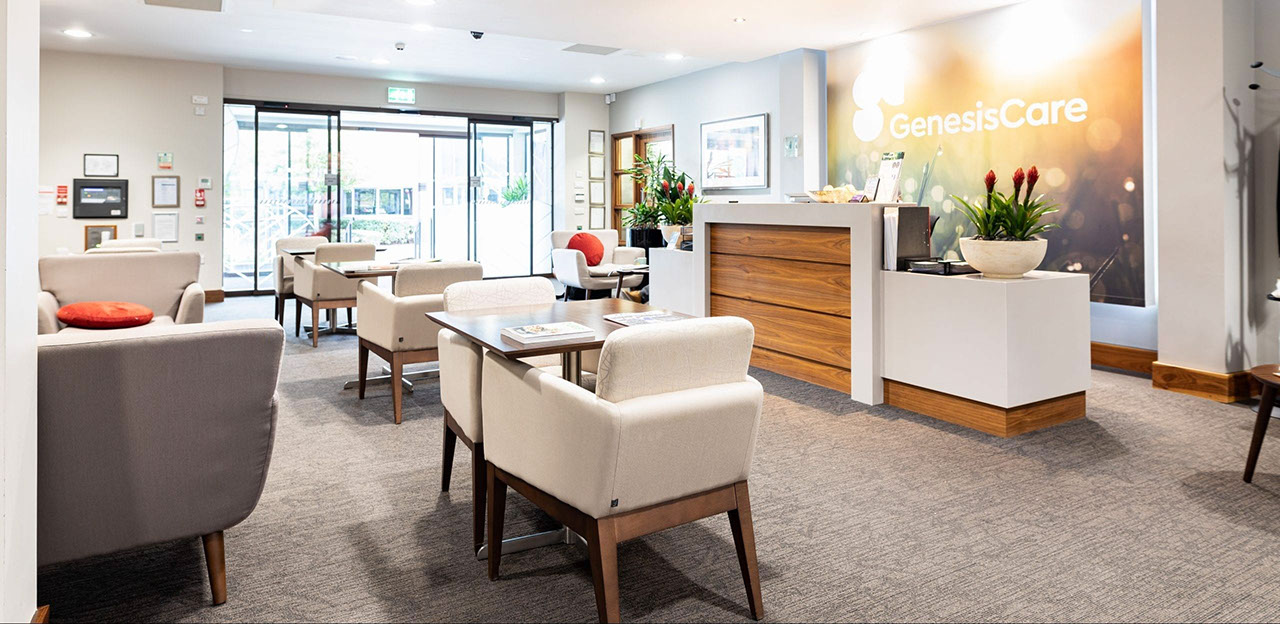- Patients
- Cancer treatments
- Radiotherapy
- MR Linac
- MRI-guided adiotherapy for pancreatic cancer

MRI-guided radiotherapy for pancreatic cancer
State-of-the-art technology that targets moving tumours and protects surrounding tissues
Precision radiotherapy
At GenesisCare, we provide specialist cancer care to thousands of people worldwide. We offer cutting-edge, innovative cancer treatments that are clinically proven to be safe and effective.
We’re proud to be the first independent healthcare provider in the UK to introduce advanced MR Linac technology. This world-class radiotherapy system is available at our centres in Surrey, Oxford and Cromwell Hospital in London and can be accessed by patients throughout the UK. It’s a new way of delivering stereotactic ablative radiotherapy (SABR) called MRI-guided SABR. SABR allows radiation doses that can control tumour growth to be delivered in a much shorter time – just five days – and there is evidence that it may be more effective than chemoradiation in prolonging survival for pancreatic cancer. For these reasons, SABR is an accepted standard of care in many parts of the world. At the current time, it is not provided by the NHS in England for pancreatic cancer.
Tumours in the abdomen are often in close proximity to normal tissues, such as the stomach or small bowel which are at risk of damage from conventional radiotherapy. The combination of an MRI scanner with a radiotherapy machine, as well as other technical innovations that have been incorporated into the MR Linac, offers advantages for the delivery of safe and effective SABR.
GenesisCare is an expert provider of SABR treatments and has invested in the MR Linac technology to offer our patients access to this latest, world-class treatment here in the UK.
Enquire about the MR Linac
The MR Linac technology is available at our centres in Surrey, Oxford and Cromwell Hospital in London. Your cancer specialist can refer you for a consultation. We’re recognised by all major insurers and we’ll help you with transport depending on treatment and locations, when required.
Benefits of the MR Linac
See with greater accuracy
The MRI scanner gives the ability to see and target the tumour, while sparing normal tissue, and thereby reducing the chance of side effects
Adapt to changes
As the position and shape of the tumour and normal tissue changes, the MR Linac allows us to alter the way the radiotherapy is given at each treatment for the best possible outcome
Target during treatment
If a tumour temporarily moves out of position – when you breathe, for example – the treatment will automatically pause
Fast access to treatment
For people with pancreatic cancer, fast treatment is essential as they can become ill very quickly. That's why we offer a rapid access pathway for those with pancreatic cancer that hasn’t spread outside the pancreas. Eligible patients can start treatment within five working days of their oncologist agreeing treatment with them, and the referral being received. This approach maximises the chance of getting the best outcome from treatment, and is available to patients with private medical insurance and those wishing to self-fund their care.
MRI-guided radiotherapy for pancreatic cancer
Having radiotherapy on the MR Linac may be suitable for you if you have pancreatic cancer near to other organs or a tumour that is likely to move around when to breathing. The MR Linac is mostly used to treat inoperable tumours, which is common in patients with pancreatic cancer. It’s not usually helpful if your pancreatic cancer has spread to other organs.
As each treatment can take over an hour, you must also be comfortable lying within the MR Linac for that length of time.
Your oncologist (a consultant doctor who specialises in cancer) will plan your treatment by discussing your pancreatic cancer diagnosis, treatments to date and overall health with a team of oncologists who are highly trained in delivering MRI-guided radiotherapy. By working together, they’ll create a personalised treatment plan and will explain the treatment in detail to you and provide you with written information about what to expect, as well as give you plenty of opportunity to ask questions.
If you choose to have your cancer treatment at GenesisCare, you’ll also have access to integrated cancer care, such as psychological support and wellbeing therapies, at no extra cost to you or your insurer. These therapies have been shown to reduce the burden of cancer and improve your quality of life, by helping to reduce symptoms and side effects of treatments and alleviate cancer-related concerns.
This is our commitment to offer world-class care to every patient with cancer.
Side effects
All treatments carry risks, so it’s important that you discuss your treatment and any options you have with your doctor to understand what’s right for you and what to expect.
You may experience the following during your treatment course, but they will usually disappear within three to four weeks. Your GenesisCare consultant will explain the side effects most relevant to you in detail before your treatment commences.
Common short-term side effects include:
- Fatigue
- Nausea
- Acid reflux
- Temporary worsening of pre-existing symptoms
Uncommon short-term side effects include diarrhoea and loss of appetite.
Your GenesisCare consultant will discuss with you which of these you may experience. It’s important that you attend your follow-up appointments so we can identify and treat any problems as soon as possible. Your consultant and radiographers can also provide advice about things you can try to help, and no question is too small if you have any queries or concerns.
We know that living with cancer is challenging. That’s why you’ll also be offered support through life-changing therapies, such as psychological support and wellbeing therapies. These are provided to all patients at no extra cost to you or your insurer, to help you manage the side effects of treatment and symptoms of cancer.
What does MR Linac treatment involve?
Here is an outline of what to expect after your initial consultation and before, during and after your treatment. There are four stages to the process: your planning appointment, planning, treatment and follow-up. Before your first appointment, your care team will call you to explain any preparation instructions in advance of your appointments and to answer any questions.
The appointment will last two to three hours and will involve a magnetic resonance imaging (MRI) scan in the MR Linac and a computed tomography (CT) scan.
- Your radiographer will explain the process and ask you to fill in a safety questionnaire
- They’ll ask you to change into a gown and remove any metal objects such as jewellery, hearing aids, glasses or dentures
- You may have a cannula (thin tube) inserted into your arm to inject a dye that improves the quality of your scans
- You’ll be put in position for your MRI scan in the MR Linac. Your radiographer will make temporary markings on your skin and place soft pads (called coils) over your abdomen that help to produce high-quality images. They may ask you to drink some water just before your scan
- The scan will take about 30 minutes. You can speak to your radiographer through an intercom system. They’ll give you breathing instructions to follow to help minimise movement of your internal anatomy. You can also listen to music using special earphones
- When your MRI scan is complete, you’ll go to another room for your CT scan, which takes about 20 minutes. You’ll be placed in the same position as your MRI scan and given breathing instructions again
- After your scans, you can go home. If you had a dye injected, you should drink plenty of water to flush it from your system
Over the next week, your consultant and care team will work together to create a radiotherapy plan that is specific to you using advanced computer technology.
Your treatment will be individualised to you so not all of the steps below will be applicable. Your GenesisCare care team will explain what will happen at each appointment.
You’ll need to fast for four hours before each session. If you’re having treatment to your liver, you may have a cannula inserted into your arm to inject a dye that improves the quality of your scans.
You’ll carry out many of the same steps as at your planning scans, such as removing accessories, changing clothes, getting into position and having the coils placed on your abdomen.
Before each session, you’ll have a new MRI scan which will be compared with your planning scans. Your treatment plan will then be carefully adjusted and optimised to account for any movement of your tumour and internal organs.
Your treatment will take approximately 75 to 90 minutes. Your radiographer will ask you to follow breathing instructions for around 20 to 25 minutes during your treatment using a computer screen to help you. You can go straight home after each session. You’ll be given contact details for your care team so you can call if you have any questions.
After your treatment course has finished, you’ll be referred back to your own doctor with all the information they need to plan any further treatment you may require.
Seven to ten days later: a member of your GenesisCare care team will call to see how you’re feeling and answer any questions you may have.
Four to six weeks later: you’ll have a review with your GenesisCare consultant.
In the longer term, your GenesisCare care team will continue to follow up on your recovery and wellbeing through appointments, phone calls and emails.

Patient stories
Enquire now about the MRIdian
The MRIdian is available at our centres in Surrey, Oxford and Cromwell Hospital in London. Your cancer specialist can refer you for a consultation. We’re recognised by all major insurers and we’ll help you with transport depending on treatment and locations, when required.
Find your nearest centre
Benefits of the MRIdian
See with greater accuracy
The MRI scanner gives the ability to see and target the tumour, while sparing normal tissue, and thereby reducing the chance of side effects
Adapt to changes
As the position and shape of the tumour and normal tissue changes, the MRIdian allows us to alter the way the radiotherapy is given at each treatment for the best possible outcome
Target during treatment
If a tumour temporarily moves out of position – when you breathe, for example – the treatment will automatically pause

.jpeg)
